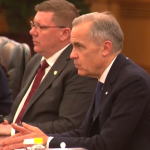![]() California Gov. Gavin Newsom on Sept. 20 signed a bill that would prohibit most law enforcement officers—including federal agents—from wearing masks during official operations in the state.
California Gov. Gavin Newsom on Sept. 20 signed a bill that would prohibit most law enforcement officers—including federal agents—from wearing masks during official operations in the state.
The first-of-its-kind law, which would go into effect in January 2026, was immediately criticized by Trump administration officials, who have instructed federal agents to ignore it. That sets the stage for a showdown in court.
Immigration and Customs Enforcement (ICE) agents—who are most involved in carrying out President Donald Trump’s deportation operations—have taken to wearing masks while carrying out their jobs.
“The impact of these policies all across this city, our state, and nation are terrifying,” Newsom said. “It’s like a dystopian sci-fi movie. Unmarked cars, people in masks, people quite literally disappearing. No due process, no rights in a democracy where we have rights.”
The administration has defended the use of masking by federal agents, who officials say are facing increased threats and violence related to their work.
The bill signed by Newsom was passed by the California Legislature on Sept. 18, despite questions about whether the state would be able to enforce it on federal agents.
The California law bars local and federal officers, including ICE agents, from wearing neck gaiters, ski masks, and other facial coverings.
It makes exceptions for medical masks—including N95 respirators—and tactical gear. State police are exempted from the law entirely.
Newsom said that the bill was designed to hold federal agents to the same standards to which local law enforcement officials are held.
“ICE, unmask. What are you afraid of?” Newsom said. “You’re gonna go out, you’re gonna do enforcement—provide an ID, tell us which agency you represent, provide basic information that all local enforcement is required to provide.”
Officials in the Trump administration quickly denounced the law, challenging California’s authority to enforce such rules on federal agents.
Essayli said he had informed federal agencies in his jurisdiction that “the law signed today has no effect on our operations.”
“Our agents will continue to protect their identities,” he said.
Harmeet Dhillon, assistant attorney general for civil rights at the Department of Justice, said the California law was “silly and futile.”
Department of Homeland Security Assistant Secretary for Public Affairs Tricia McLaughlin, said the California law is a “despicable and a flagrant attempt to endanger our officers.”
“While our federal law enforcement officers are being assaulted by rioters and having rocks and Molotov cocktails thrown at them, a sanctuary politician is trying to outlaw officers wearing masks to protect themselves from being doxxed and targeted by known and suspected terrorist sympathizers,” she said.
The issue is likely to end up in federal courts, as it deals with constitutional questions about the lines between state and federal authority.
Precedent broadly favors federal law’s supremacy over state law, which could make it difficult for California to uphold the ban.











